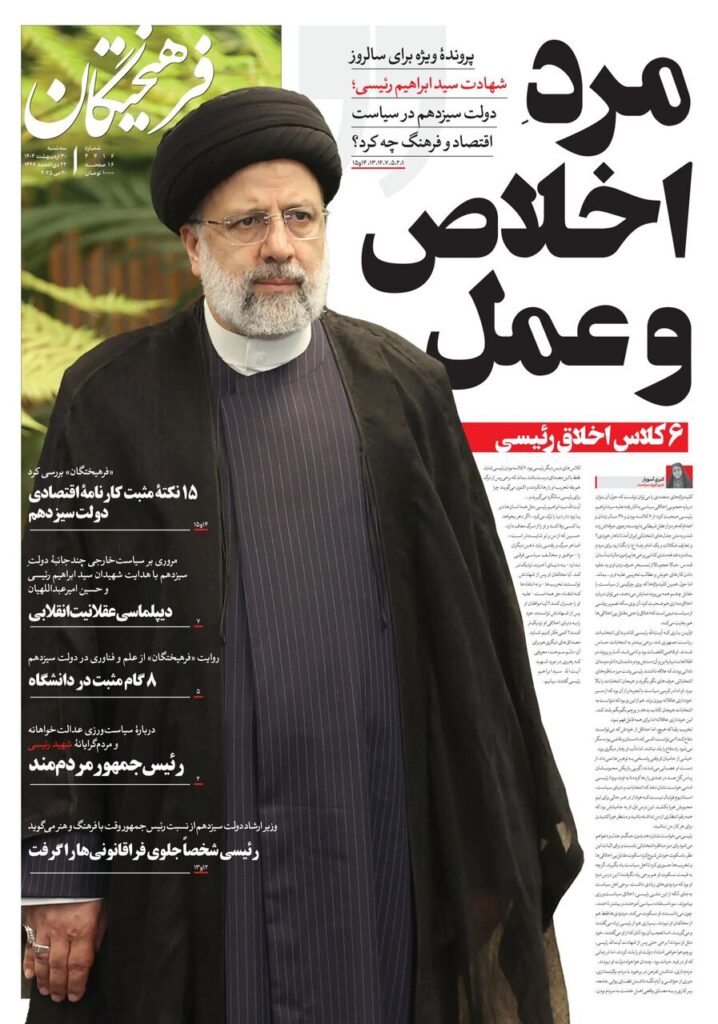TEHRAN-Farhiktegan tackles the tension atmosphere between Iran and the US before negotiations for the fifth round, and while the fifth round of negotiations with the Americans has not yet begun, senior members of the US negotiating team are trying to raise ambitious demands in the media.
Steve Witkoff mentioned the issue in an interview with ABC on May 18th. The US said in negotiations with Iran that “we cannot allow 1% of its enrichment capacity.” Aragut replied that Iran continues to be enriched. Of course, it is still uncertain whether Americans are causing Americans to rule out the prime minister because the pastor has a prime minister. Through the media, Iran is a failed project, and Iran will not retreat from its enrichment rights.
Hamshahri: ?? a “Nuclear Consortium” for Tehran’s Green Light
During the analysis, Hamshari discussed the idea of a nuclear consortium and Iran’s satisfaction with the proposal. According to the paper, Iran has reportedly proposed a partnership with the United Arab Emirates and Saudi Arabia for uranium enrichment. Therefore, if this idea is accepted, Saudi Arabia and Emirates will become shareholders and financial providers, and have access to Iranian technology. The idea of creating a “nuclear consortium” has, although old, become a topic of discussion once again, sparking a response in indirect negotiations between Iran and the United States. Iran shows that he is satisfied with the proposal, but it is still unclear whether the US and the Persian Gulf Arab countries are satisfied as well. Participation of Persian Gulf countries in Iran’s enrichment projects can be seen as a kind of “additional security guarantee” that meets the US requirements to ensure that Iran’s nuclear program is not diverted for military purposes. Some Arab countries in the region do not welcome the idea. Implementing such an agreement would lead to Saudi Arabia and other countries becoming dependent on Iran, making it unlikely that they would accept it without the guarantees of the US or Russia.
Sobh-e-no: Why does Iran claim to enrichment?
Iran’s uranium enrichment programme is not only a technology programme, but also part of the country’s strategic identity and scientific independence. The enrichment programme is a symbol of independence and resistance to pressure from global forces. From this perspective, stopping enrichment means not only political concessions, but withdrawal from scientific and technological achievements. Uranium enrichment in Iran is not the ultimate goal, but a means of achieving strategic science, energy, healthcare and industrial goals. Stopping this process means stopping the growth of Indigenous knowledge and re-dependent on the West. Furthermore, despite Iran’s commitment, the bitter experience of the JCPOA, in which Western organizations failed to fulfill their economic obligations, has made the Iranian negotiating team appear far more cautious about the new agreement. Therefore, Iranian officials have warned that if enrichment is stopped under US pressure, Washington’s next step is to put pressure on the country’s missile program and subsequent security areas. In this respect, Araguchi emphasizes, “We are not surrender, we are the people of negotiation.”
Jam-e-Jam: Iran is a pioneer in regional diplomacy
In his commentary, Jam-e-Jam worked on the Tehran dialogue forum, saying: As one of the most prominent platforms of Iranian diplomacy, the forum is an opportunity to exchange, promote and explain Iran’s pivotal role in the new regional and global order. By adopting a “zero tension” policy with its neighbors, the Islamic Republic of Iran has adopted an intellectual and practical approach based on strengthening diplomatic relations, reducing tensions and expanding economic and security cooperation between neighboring countries and regions. Iran’s zero tension policy shows Tehran’s resolve to create stability in West Asia and its neighbourhoods given the dynamic diplomacy of the Foreign Ministry’s claims on the policy at the Tehran Dialogue Forum. Araguchi’s statement, coupled with termination sanctions, highlighted fair (nuclear) trade, not only revealed Iran’s position on nuclear talks, but also highlighted Tehran’s role in promoting regional peace and security. In regions where foreign powers often seek to expand conflict, Iran’s approach could serve as a constructive model for other countries in the region.

